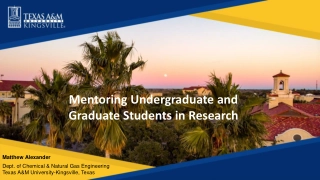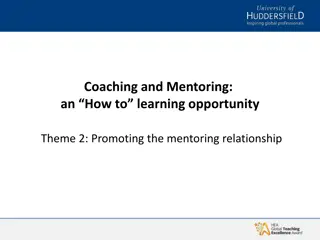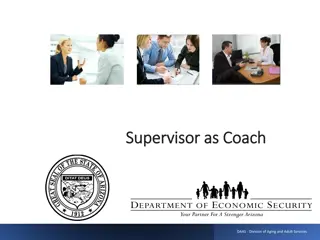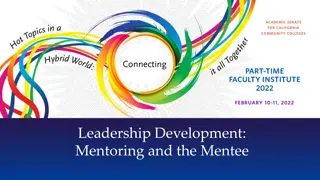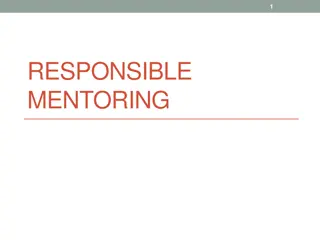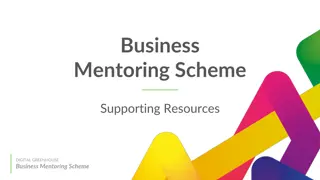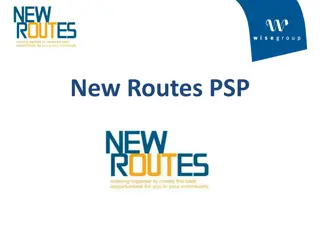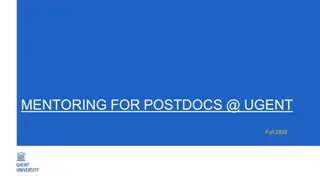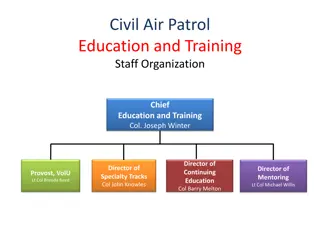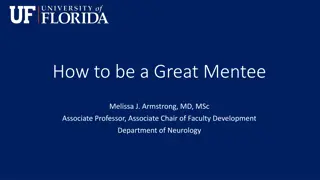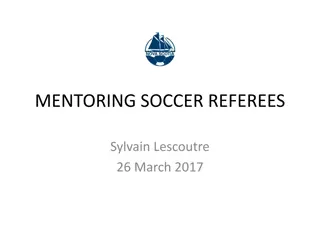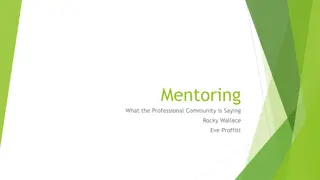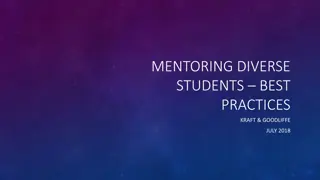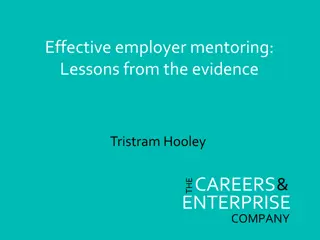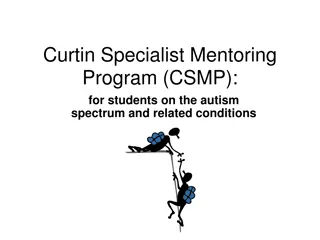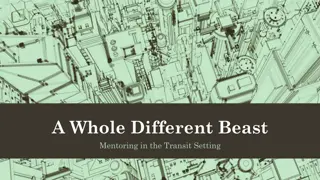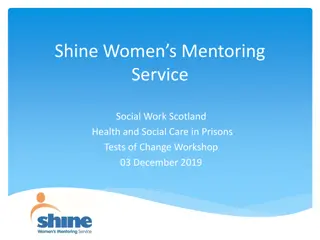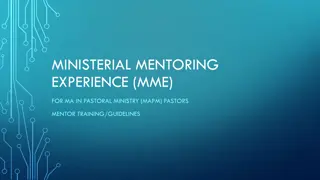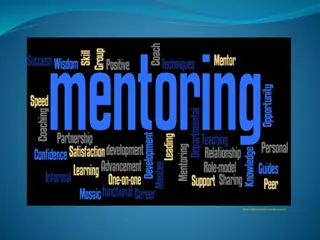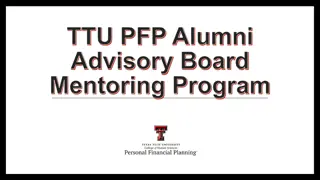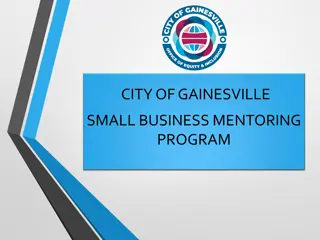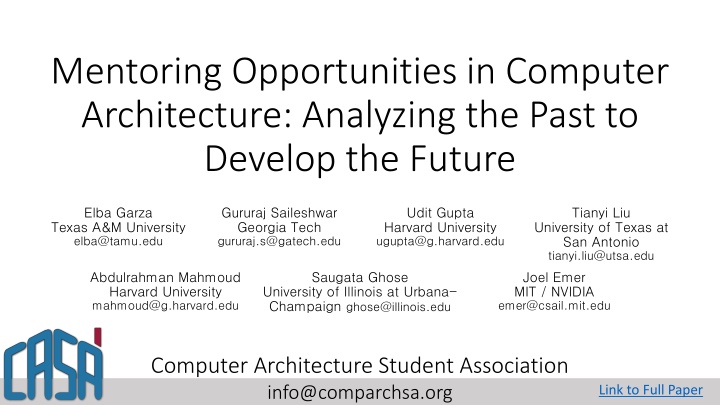
Analyzing Mentoring Opportunities in Computer Architecture
Explore the current state of mentoring programs in computer architecture, focusing on two author-led initiatives: Meet-a-Senior-Architect (MaSA) and Meet-a-Senior-Student (MaSS). Learn how feedback and mentoring research can guide the development of longer-term mentorship in the computer architecture community.
Download Presentation

Please find below an Image/Link to download the presentation.
The content on the website is provided AS IS for your information and personal use only. It may not be sold, licensed, or shared on other websites without obtaining consent from the author. If you encounter any issues during the download, it is possible that the publisher has removed the file from their server.
You are allowed to download the files provided on this website for personal or commercial use, subject to the condition that they are used lawfully. All files are the property of their respective owners.
The content on the website is provided AS IS for your information and personal use only. It may not be sold, licensed, or shared on other websites without obtaining consent from the author.
E N D
Presentation Transcript
Mentoring Opportunities in Computer Architecture: Analyzing the Past to Develop the Future Elba Garza Texas A&M University elba@tamu.edu Gururaj Saileshwar Georgia Tech gururaj.s@gatech.edu Udit Gupta Harvard University ugupta@g.harvard.edu Tianyi Liu University of Texas at San Antonio tianyi.liu@utsa.edu Abdulrahman Mahmoud Harvard University mahmoud@g.harvard.edu Saugata Ghose University of Illinois at Urbana- Champaign ghose@illinois.edu Joel Emer MIT / NVIDIA emer@csail.mit.edu Computer Architecture Student Association info@comparchsa.org Link to Full Paper
Mentoring & Computer Architecture Common yet powerful tool to support, engage, & retain students Definition: Entity in a senior position taking on a supporting role of oversight and encouragement of a less experienced entity Computer architecture community hosts assortment of mentoring programs geared toward: women & historically marginalized students junior graduate students undergraduates COVID-19 Disadvantaging newer, younger members of community Mentoring programming more important than ever 2
Current Mentoring Programming Year Established Co-located or Host Conference Target Mentoring Population Mentoring Program Career Workshop for Women and Minorities in Computer Architecture (CWWMCA) 2014 MICRO Women & historically underrepresented groups Young Architect Workshop (YArch) 2019 HPCA, ASPLOS Junior graduate students (1st/2nd year PhD & Masters) Undergraduate Architecture Mentoring Workshop (uArch) 2019 ISCA Undergraduate & Masters students Meet-a-Senior-Architect/Student (MaSA/MaSS) 2016/2020 ISCA, MICRO, ASPLOS Students at all levels All programs are short-term by nature 3
Long-Term Mentoring Aren t students PhD advisors also their mentors? Not necessarily. Mentors offer various forms of support: Instrumental Psychosocial Networking Transition from advisor-advisee to mentor-mentee relationship takes time. 4
In this work Outline current state of mentoring programming opportunities in Computer Architecture Describe organization of two author-run programs: Meet-a-Senior- Architect (MaSA) and Meet-a-Senior-Student (MaSS) Analyze feedback and use relevant mentoring research literature to make case for developing longer-term mentoring for Computer Architecture community 5
Meet-a-Senior-Architect (MaSA) Short-term at-conference mentoring program between senior members and current students Program expectation: 20-30 minute informal meeting Conceived by Joel Emer; basing on similar program at University of Chicago Sponsored by SIGARCH, held continuously at ISCA since 2016. Extended to MICRO and ASPLOS in 2020-2021. 6
Meet-a-Senior-Student (MaSS) Offshoot of MaSA, organized by Computer Architecture Student Association (CASA) with help from Joel Emer for MICRO-53 Also a short-term at-conference mentoring program, but between senior (3rd+ year PhD Students) and junior (1st/2nd year PhD and Masters) students Similar program expectations (i.e. 20-30 minute meeting), anticipating student-focused topics and conversation 7
Organizing MaSA and MaSS Mentor/Mentee sign-up has varied over the years: Mentees solicited from those receiving travel grants (2016) Mentees solicited during registration (2017) Mentors solicited individually by organizer (2016 & 2017) Mentors/Mentees solicited during registration (2018-current) Mentor selection by mentees has also evolved: Ranked-choice of 10 mentors from list (2017-2019) Select from either academia or industry (2017-2019, ASPLOS 2021) Select from list of research areas (ASPLOS 2021) 8
Organizing MaSA and MaSS Given information, set of Python scripts implements a variant of the stable marriage problem to match students to mentors; matches are emailed Mentees advised to contact mentors, coordinating time (and place) to meet for 20-30 minutes Suggested discussion topics: research, career growth, managing work- life balance in academia, etc. 9
MaSA General Feedback ISCA MaSA Written Feedback This program was a wonderful opportunity to meet with a senior member of the architecture community who I doubt I would have had the nerve to speak to otherwise! It speaks to the value placed on maintaining the architecture community, so thank you to all of those who put their time into organizing it and participating as mentors!" 2017 It is a good idea to match a first time student attendee with another student as well. It is a good start point for networking and finding friends in conferences." 2018 It would be great to have someone in my field and continue this relationship in the future. I believe this is a great opportunity for young computer architects like me to talk with senior architects and learn from their experiences. Thank you so much for organizing this!" 2018 I think in the mentor selection process (the Google form), it would have been nice to see the research topic of each mentor, in addition to where they work. That would have been very helpful." 2019 Every conference of our area should provide this opportunity." 2019 This was a great program! I have benefited from this two years in a row. I have a suggestion: how about taking this mentorship experience throughout the year? Instead of meeting our chosen mentor once a year, perhaps we can set up 4 phone/video calls a year with the same mentor. It will be useful to have a continued relationship and will also help mentors see the impact of their mentorship better." 2019 10
MaSS @ MICRO 2020 Feedback Anonymous survey, 11 mentors and 19 mentees 73% of mentors 90% of mentees MaSS interactions are (very) useful! All mentors and mentees indicate they would participate in future MaSS iterations 11 11
MaSS Suggestions Suggestion Written Feedback #1 I can t remember what the registration as a mentor was like, so excuse me if this was already done. I think it might be useful for the mentors to broadly select their fields (e.g. security, GPUs, microarch, etc.) and then the mentees could select which field they d like to match with." #2 Please ask mentees to schedule at least 30 minute long slots. Any shorter, and the conversation is not productive." #3 MASS was an amazing initiative and I will continue to participate in it in future conferences as much as possible. Another addition (not modification) to MASS can be Meet a Group of Students - where 4 students are paired and they get to have a group chat, this essentially provides an opportunity to network with more people at once (it may or may not be based on mutual interests as architecture itself is the mutual interest)." 13
Organizational Challenges & Learnings Automation: For scalability and wide adoptability, it s crucial to minimize administrative effort to organize programming Matching Interests: For best engagement, it s critical to match mentees with mentors of their preference, and with overlapping interests Maintaining Engagement: Each iteration had shortage of mentors; more awareness about MaSA is necessary in community. With a match, even simple nudges mid-way through conferences also help meetings happen! 14
What is Mentoring? Intuitive, yet difficult to define over 50 differing academic definitions! Via Etymology: Mentoring is act between two people where the more experienced counsels the less experienced, usually younger, party Ubiquitous; found to be beneficial in business, academics, and personal development Athena and her wise owl on a Greek tetradrachm 15
Mentoring Benefits for Academia Correlates with presenting at conferences, publishing articles/book chapters, & securing postgraduate funding Generates cycle of mentorship for later student generations Especially crucial for underrepresented and marginalized students: Increased scholarly submissions, paper acceptances, conference attendance Higher resulting GPAs, increased completed credit-hours, reduced attrition 16
Types of Mentoring Support Types of Mentoring Support Instrumental Support: Concrete activities to help build mentee s knowledge raises mentee s academic competence in field knowledge raises mentee s academic competence in field Instrumental Support: Concrete activities to help build mentee s Psychosocial Support: Personal encouragement, counseling, and emotional support builds mentee s sense of competence and belonging belonging Psychosocial Support: Personal encouragement, counseling, and emotional support builds mentee s sense of competence and Networking Support: Advocating for, expanding and including in academic network creates opportunities for mentee in field academic network creates opportunities for mentee in field Networking Support: Advocating for, expanding and including in 17 17
Need for Long-Term Mentoring Implicit assumption that academic research advisor is, by virtue of position, their advisees mentor. Not so fast! It s fully possible for advisor-advisee relationship to fail to manifest psychosocial support while still being academically successful! If student does not have mentorship with advisor (or even lacks advisor), she/he may look elsewhere to develop connection There is a need for longer-term mentoring in our community! 18

